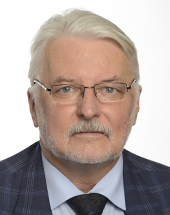9th parliamentary term Witold Jan WASZCZYKOWSKI
Political groups
- 02-07-2019 / 15-07-2024 : European Conservatives and Reformists Group - Member
National parties
- 02-07-2019 / 15-07-2024 : Prawo i Sprawiedliwość (Poland)
Chair
- 26-09-2019 / 15-07-2024 : Delegation to the EU-Ukraine Parliamentary Association Committee
Vice-Chair
- 10-07-2019 / 19-01-2022 : Committee on Foreign Affairs
- 20-01-2022 / 15-07-2024 : Committee on Foreign Affairs
Member
- 02-07-2019 / 09-07-2019 : Committee on Foreign Affairs
- 02-07-2019 / 15-07-2019 : Subcommittee on Human Rights
- 02-07-2019 / 25-09-2019 : Delegation to the EU-Ukraine Parliamentary Association Committee
- 02-07-2019 / 19-01-2022 : Subcommittee on Security and Defence
- 02-07-2019 / 15-07-2024 : Delegation to the Euronest Parliamentary Assembly
- 26-09-2019 / 15-07-2024 : Conference of Delegation Chairs
- 20-01-2022 / 15-07-2024 : Subcommittee on Security and Defence
Substitute
- 02-07-2019 / 19-01-2022 : Committee on International Trade
- 20-01-2022 / 15-07-2024 : Committee on International Trade
Main parliamentary activities
Contributions to plenary debates
Reports - as rapporteur
A rapporteur is appointed in the responsible parliamentary committee to draft a report on proposals of a legislative or budgetary nature, or other issues. In drafting their report, rapporteurs may consult with relevant experts and stakeholders. They are also responsible for the drafting of compromise amendments and negotiations with shadow rapporteurs. Reports adopted at committee level are then examined and voted on in plenary. Rule 55
Reports - as shadow rapporteur
Political groups designate a shadow rapporteur for each report in the responsible committee to follow progress and negotiate compromise texts with the rapporteur. Rule 215
Opinions - as shadow rapporteur
Political groups designate a shadow rapporteur for an opinion to follow progress and negotiate compromise texts with the rapporteur. Rule 215
Motions for resolutions
Oral questions
Questions for oral answer with debate, addressed to the European Commission, the Council or the Vice-President of the Commission/High Representative of the Union can be tabled by a committee, a political group or at least 5% of Parliament’s members. Rule 136
Other parliamentary activities
Written explanations of vote
Members can submit a written explanation of their vote in plenary. Rule 194
Written questions
Questions to the Bureau, the Conference of Presidents and the Quaestors
Members can submit questions to the President concerning the Bureau, the Conference of Presidents and the Quaestors as regards their respective duties. Rule 32(2)
Questions to the ECB and concerning the SSM and the SRM
Answers to questions to the ECB and concerning the SSM and the SRM
Individual motions for resolutions
In accordance with Rule 143 of Parliament's Rules of Procedure, any individual Member may table a motion for resolution on a matter falling within the spheres of activity of the EU. These motions for resolution express the position of the individual Members who tabled them. Admissible motions are referred to the committee responsible, which shall decide whether to follow up the motion for resolution and, if so, which procedure is to be followed. Where a committee has decided to follow-up a motion for resolution, more detailed information is provided on this page, below the resolution in question. Rule 143
Declarations
All declarations below have been signed by the Member, even if the signature is not visible in the online copy.

